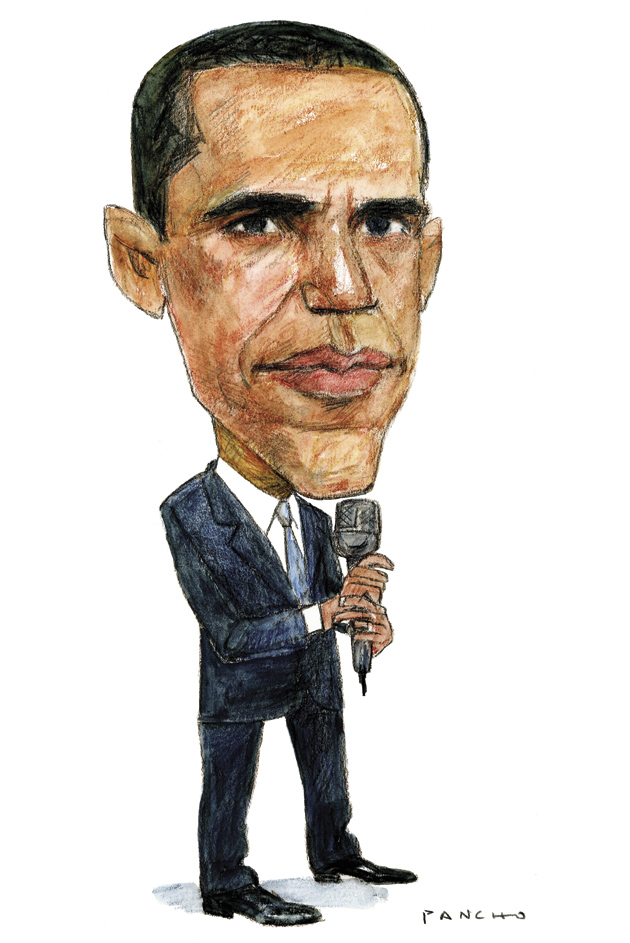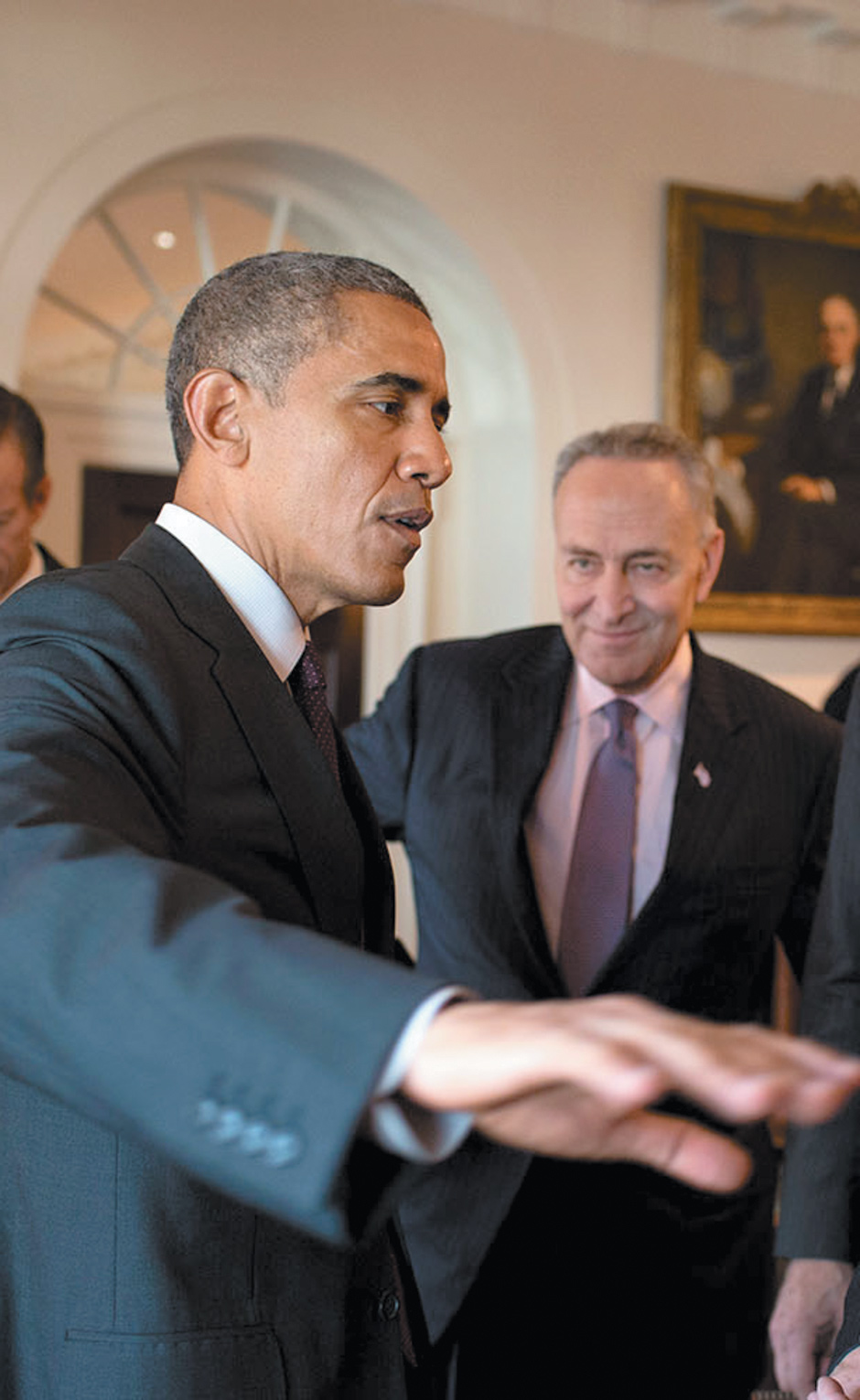The president’s congressional victory on the nuclear agreement with Iran had many sources, not least of which were the nature and tactics of the opposition. It might have been more difficult to achieve if the Republicans as well as Israeli Prime Minister Benjamin Netanyahu and his allied American group, the American Israel Public Affairs Committee (AIPAC), had given any sense that they had thoughtfully considered the deal that six nations reached with Iran, or if they had offered any alternative. But the agreement with Iran collided with the current state of American politics.
Once the nuclear deal was presented to Congress in July, there was little question that it would fall into the deep crevasse that had developed between the two political parties. Ever since Barack Obama took office in 2009, the Republicans have opposed everything he wanted to do. In keeping with this strategy, within days of the deal’s being announced, numerous Republicans, without bothering to read the agreement or consider it seriously, jumped to oppose it.
The debate on the deal throughout was only ostensibly on its merits. The Republicans’ contempt for Obama—as a Democrat, as a black person, as, in the view of many of them, an illegitimate president—was clear to any close observer. For the first time in US history, the opposition party thumbed its nose at the president by inviting the head of another nation—Netanyahu—to address Congress to urge rejection of an international measure the president supported. When Secretary of State John Kerry, a former chairman of the Senate Foreign Relations Committee, appeared before it to testify on the agreement, he was greeted with overt contempt by its Republican members. The current chairman, Bob Corker of Tennessee, told him, “You’ve been fleeced.”
The fight in Congress over the Iran deal will go down as one of the major foreign policy struggles in this country’s history. Legislative fights involving grave issues of the security of this nation are supposedly conducted on a higher level than more typical legislation. But never before in memory was the vitriol so strong as it was in this one. To the extent that this didn’t stem from disrespect for the president, its cause was largely that Iran infuriates politicians more than perhaps any other nation except North Korea. Every time an ayatollah says “Death to the Great Satan,” numerous Republicans get very agitated and want to take action—of some sort.
A great deal of money went into the struggle over the agreement. The lead in opposing it was taken by AIPAC, which aligns itself on Israel’s security matters with the Likud party and its leader, Netanyahu. (When the more peace-minded Yitzahk Rabin was prime minister, his relationship with AIPAC was rocky.) Until this fight AIPAC was seen as a fearsome organization with the muscle and money to almost always get its way with Congress. AIPAC and its allies have been reported to have spent as much as $40 million opposing the agreement, although some estimates are lower. Until this fight, AIPAC had acted as a bipartisan organization, but in vehemently opposing the deal it became an ally of the Republicans in a highly partisan fight.
Allied with AIPAC were other Jewish organizations such as the Anti- Defamation League; various local Jewish Federations; the Zionist Organization of America, which—on the day of the Senate’s voting and with the deal’s proponents clearly winning—sponsored a rally on Capitol Hill against the deal, featuring Ted Cruz and Donald Trump. The casino billionaire Sheldon Adelson poured millions into this fight through the National Zionist Organization. Also active were Bill Kristol’s Emergency Committee for Israel and the Republican Jewish Coalition, a very ideologically hawkish group, which in 2008 linked Obama to Mahmoud Ahmadinejad, Reverend Jeremiah Wright, and Patrick Buchanan. It was understood by the Republican presidential candidates that strong opposition to the deal was a possible route to big campaign contributions from Adelson. The candidates were divided only over whether they would kill the deal on their first day in office or give it a little more time.
On the other side, favoring the deal, were J Street, the Arms Control Association, MoveOn.org, the Friends Committee on National Legislation, the National Iranian American Council, the anti-nuclear Ploughshares Fund, the Council for a Livable World, and Catholic leaders. J Street, a group founded in 2008 that favors a two-state solution, supported the deal. J Street had a lot less money than AIPAC to spend on this fight, but it had enough to mount a big challenge to it.
While both AIPAC and J Street are called “pro-Israel,” the principal difference between them is that J Street doesn’t think it must support every position of the Israeli government—especially if it believes that something that the government proposes or does isn’t in Israel’s or the US’s interest. J Street has been critical, for example, of Israeli settlements in the West Bank as a barrier to a two-state solution. Whatever the personal tensions between Obama and Netanyahu—Netanyahu’s pedantry in lecturing Obama in the Oval Office on the perils of Israel’s situation visibly annoyed him—Obama has maintained and even strengthened US military ties with Israel.
Advertisement
The Catholic leaders who backed the deal included Cardinal Theodore McCarrick, the former archbishop of Washington, and the influential United States Conference of Bishops—all endorsing the negotiations with Iran as taking a peaceful approach.
Pope Francis himself said in January that he hoped that a “definitive agreement may soon be reached between Iran and the P5+1 group regarding the use of nuclear energy for peaceful purposes,” and he endorsed the negotiations underway. The Vatican later endorsed the deal.
Of the fourteen Catholic senators whose position on the deal wasn’t certain, thirteen voted for it, the lone dissenter being Joe Manchin of West Virginia, who had made positive statements about it but on the morning the voting was to begin disappointed the pro-deal advocates by announcing that he opposed it. Manchin said that as he traveled around his state during the August recess he found that his constituents were very strongly opposed to the deal (Obama is quite unpopular in West Virginia).
A battle of lists broke out: each side presented lists of eminent people who were for or against the deal. Those for it included five former ambassadors to Israel and other foreign policy officials; nuclear scientists; retired generals; rabbis (over three hundred of them); and former members of Congress—some of them with a strong record of supporting Israel. The lists against the deal also included former generals and admirals (over two hundred of them), among them John Poindexter and Richard Secord, major figures in the Iran-contra scandal; and retired Lieutenant General William G. “Jerry” Boykin, who served under George W. Bush and gave speeches calling US operations against Islamic extremist groups war between Christians and Satan.
Each side had support from Israeli officials: current ones were against the deal, while former heads of intelligence and the military said that it was good for Israel’s security. Each side had some of these officials flown over to meet with members of Congress. The lists were considered particularly important on the pro side of the argument, giving that view legitimacy. Even more important, though, especially on the side supporting the deal, were former foreign policy officials, such as Brent Scowcroft, Richard Lugar, Sam Nunn, and particularly Colin Powell, who in his appearance on Meet the Press on the Sunday before the voting was to begin in Congress made a powerful case for the deal.
The Iran deal was the president’s highest foreign policy priority and it represented a major break with the past. In 2008 the candidate Obama had said that the United States should be prepared to negotiate with its adversaries. Many, including his opponent Hillary Clinton, called this unrealistic and naive. But Obama has made a historic move in offering recognition of Cuba, and now was making a breakthrough with the Iran agreement.
The president treated the agreement as an executive action that didn’t require congressional approval—as opposed to a treaty that required the approving votes of two thirds of the Senate, a requirement its proponents had no chance of meeting. While Obama was correct that the Iran deal didn’t have to be approved by Congress, that view didn’t reflect political reality. Not just the deal’s Republican opponents but several Democrats, some already troubled by US actions in Iraq and Syria that were proceeding without new congressional authorization, also wanted Congress to have a voice on the agreement.
In early May, by a vote of 98–1, legislation proposed by the Republican Bob Corker of Tennessee and the Democrat Ben Cardin of Maryland was passed by the Senate. The two parties in the Committee on Foreign Relations agreed that a resolution to disapprove the deal—which was likely, since the Republicans were in control of the Senate—would have to win sixty votes, rather than the fifty-one that Corker had originally proposed; the requirement of sixty votes was both the usual practice in the Senate and the price of getting Democrats to agree to a resolution injecting Congress into the issue and keeping the White House from strongly opposing that. (The House required a simple majority vote to approve or disapprove the deal.) The sixty-vote requirement gave the deal’s supporters an advantage in trying to block a resolution of disapproval, since there was likely a majority in the Senate (of fifty-one votes) who were against the deal. Its supporters needed just forty-one votes to block a resolution against it.
Advertisement
The sixty-vote requirement to bring anything of consequence up in the Senate had become customary. Ever since Obama took office Senate Republicans had made a habit of “filibustering”—whether or not they engaged in an actual talkathon, which they rarely did—all significant legislation. The crucial point is that it requires sixty votes for “cloture,” to end a filibuster before the underlying measure can be brought to a vote, and that measure would require just fifty-one votes to be passed.
In reality, even if Congress were to adopt a resolution of disapproval, that wouldn’t kill the Iran agreement. The president had the power to veto the resolution and if the veto is upheld by Congress the agreement is in effect approved. The president still had the power to implement it, but of course a president would prefer not to be carrying out an agreement that had been disapproved by Congress.
Supporters of the deal were also at an advantage if it came to sustaining a presidential veto of a negative resolution: since it takes two thirds of both the Senate and the House to override a veto, the forces in favor of the deal needed only thirty-four votes in the Senate and 146 votes in the House to uphold the president’s veto. It had been assumed for some time that the House would sustain the veto, since in the spring 150 Democrats had signed a letter that endorsed the president’s approach to negotiating a nuclear deal with Iran.
But as early as last spring it occurred to both the White House and the outside groups backing the Iran agreement that if, as it appeared, they could obtain enough commitments in the Senate to sustain the veto, they should go further and try to prevent a resolution against the deal from ever reaching the president’s desk. Since sixty votes were required to pass the resolution, if the advocates of the deal could muster forty-one votes, the resolution would die in the Senate and that would be the end of it. To prevail by the larger number of votes would put the president in a stronger position. Despite his earlier expressions of willingness, Obama didn’t want to exercise his veto on the Iran deal.
Meanwhile the proponents of the deal were systematically trying to seal off avenues of escape that some Democratic senators appeared interested in taking. They wanted to avoid making the difficult choice between handing the president a defeat or alienating AIPAC as well as their constituents who strongly opposed the deal. Polls indicated that the public at large was against the deal, though the numbers varied depending on how well it was explained to survey respondents.
Some polls also indicated that a majority of Jews supported the deal, though they were of course deeply divided. Newspaper reports saying that so-and-so’s constituency has a large Jewish population told us little. For one thing, it’s not the number of people who are on each side of an issue but the intensity with which one particular side pursues its goal. This is true of bills about tax deductions and agriculture subsidies and it was true of the Iran deal. (It’s also true in presidential races.) For some Jews who subscribe to the views of AIPAC and its allies, there is to be no daylight between what Israel wants and US policy. The Jews who felt free to criticize an act by Israel, or deny it certain military equipment, tended to align with the views of J Street. Of the nine Jewish senators only Charles Schumer of New York and Ben Cardin voted against the treaty.
Shortly before the August recess Democratic Senator Dick Durbin, the party’s whip, arranged a meeting in which representatives of each of the members of the P5+1 countries—China, Russia, Britain, France and Germany—briefed Democratic senators who wished to attend; twenty-five did. The representatives made it clear that the talk on the part of the agreement’s skeptics or outright opponents that it should be junked in favor of a “better deal” was fantasy. They emphasized that their countries had no interest whatever in returning to the negotiations (not to mention the lack of interest on the part of Iran).
The P5+1 representatives emphasized that they had gotten the best deal they could, and further, that if the US rejected the deal there was hardly any chance, or no chance at all, that their countries would continue to adhere to the tough economic sanctions that had been imposed on Iran, most of which had been intended to put pressure on it to negotiate. On the contrary, the spokesmen for the allies said that their governments and companies were eager to start doing business with Iran. This meeting was said to have been highly persuasive among undecided Democrats. And it effectively removed one of the major arguments opponents had been using. Durbin’s purpose wasn’t to overtly pressure his colleagues to support the deal but to find out who was leaning which way and what was on doubters’ minds so that he might find ways to get their votes.
No one was very surprised when, in early August, Senator Charles Schumer, the presumed next Democratic leader, announced that he would oppose the deal. Schumer was known to be quite close to AIPAC and to support Likud. Still, his decision to vote against the deal disappointed some of his colleagues, who hoped that he would opt to bring his constituents along to a position in support of it. One observer said, “Chuck had his Edmund Burke moment, and he flunked.” Some of his colleagues reasoned that Schumer announced when he did—rather than, as expected, toward the end of the time when senators were making up their minds—because he could see that the deal would succeed in Congress and he didn’t want his position to be seen as irrelevant. Schumer vowed not to try to influence his colleagues’ vote and the indications are that he kept his word.
The deal’s supporters worried, though, when they learned in early September that Ben Cardin was raising questions such as: Won’t the deal survive even if it’s rejected by Congress? (Cardin ended up opposing the deal, a potential blow to it.)
While Durbin and Nancy Pelosi were tracking the votes in their respective chambers, the president took a larger part and also played rougher in this fight than had been his custom. He accused Republicans of “making common cause” with Iran’s hard-liners. He stated that the alternatives were the deal or war. Even some of his allies thought he’d gone a bit overboard with these statements, potentially alienating some undecided Democrats, and he pulled back from them. Obama responded to the requests by Pelosi and Durbin to make calls to wavering Democrats, more calls than he’d made on any previous legislation. He held special briefings in the White House for members of Congress; he participated in a conference call with the outside groups on his side. The White House set up an “anti-war room” to keep track of the votes and send out information.
By mid-August the forces who favored the Iran agreement believed that they would have at least enough votes in the Senate (thirty-four, or one third plus one) to sustain a veto by the president, though they dared not openly claim this until the thirty-four senators had publicly announced their position. And they were fairly far along on their second goal of killing the negative resolution in the Senate, but still far enough from success to be worried: by the time Congress returned from the August recess on September 8 the deal’s supporters were within eight votes of the forty-one needed to stop the resolution of disapproval in the Senate.
Among those they had been very concerned about was Cory Booker of New Jersey, known to be quite close to Rabbi Shmuley Boteach, a flamboyant Orthodox rabbi, best-selling author, and radio and television host who was passionately against the Iran deal. But on September 3, Booker announced he was for the deal; in his long, painstaking statement he said,
After hours and hours of study, research, deliberation and consultation, I am more convinced than ever that eliminating the threat of a nuclear-armed Iran is among the most important global security challenges of our time…. I…believe it is better to support a deeply flawed deal, for the alternative is worse.
Booker called for several steps to mollify Israel, including providing it with massive ordnance penetrators, otherwise known as “bunker busters,” or MOPs, which have the capacity to take out nuclear facilities, and sanctions against “Iranian terrorism.”
Statements by Booker and other Democrats who supported the deal that it was “flawed” were largely acts of political positioning—to provide some protection against constituents skeptical of or opposed to the deal, or against future issues that might arise, for example, over whether the Iranians were cheating. The core of the argument for the deal was offered by Sheldon Whitehouse of Rhode Island, who said in mid-August that he’d support the deal, because “I do not see another pathway to impose a nuclear weapons–free Iran.”
Since the Republicans offered no alternative, it came down to either the deal putting off Iranian development of a nuclear weapon for at least fifteen years or no deal, which according to experts meant that Iran could develop a nuclear weapon within a year or two, but no one can be certain. And with no deal, the sanctions would come to an end. The Republicans had no difficulty distorting the truth about the deal. But the opponents were trapped in their own illogic: they charged that the agreement prepared the way for a nuclear Iran in fifteen years. Whether or not Iran developed a nuclear bomb after fifteen years, without the deal Iran could develop a nuclear bomb a lot sooner. Moreover, some monitoring would remain in effect for twenty years and some would be permanent. Senator John Cornyn of Texas—the Republican whip—and others asserted that all verification could be held up by Iran for twenty-four days, whereas the twenty-four-day provision applies only to suspected sites and sets a limit, not a goal. Known sites are to be subject to twenty-four-hour on-site inspections.
AIPAC was known to be urging members of Congress to consider—after the voting on the deal—a package of weapons, including bunker busters (controversial because they’re considered provocative weapons) and sophisticated bombers, to comfort Israel. AIPAC representatives reportedly told senators who were torn on how to vote that it wouldn’t punish them if they both voted for the deal and also supported the new weaponry for Israel, and also sanctioned Iran for acts of terrorism. But some of the provisions of the AIPAC proposal would have the effect of strangling the nuclear deal in its cradle by imposing new sanctions or not removing existing ones as directed by the agreement.
As of September 8, the day that debate was to begin in the Senate, the proponents needed three out of the five remaining undeclared Democrats to bottle up the negative resolution in the Senate. As it turned out four came through on that day: Richard Blumenthal of Connecticut, one of the most skeptical Democrats; Gary Peters of Michigan; Ron Wyden of Oregon; and Maria Cantwell of Washington. When the fifth, Joe Manchin, came out against the deal that morning, its backers worried that others might follow, but they didn’t. On this issue, members didn’t try to influence one another; it was considered a vote of conscience that each had to decide for themselves. Seldom has an issue caused more study and consultation with officials and experts on the part of the legislators as the nuclear deal with Iran did.
Mitch McConnell wasn’t at all happy. In a statement in Kentucky in mid-August he’d grudgingly conceded that the president had “a great likelihood of success” because “the procedure is obviously stacked in the president’s favor.” Back in Washington, McConnell didn’t intend to give up easily. He proceeded to simply ignore the agreement of the members of the Foreign Relations Committee that the resolution would be considered on its merits and would require sixty votes to pass.
He knew he could win Senate approval of the pending resolution disapproving the deal if only a majority, or fifty-one votes, were needed, and so he announced that he would move to invoke cloture, or try for sixty votes to shut off debate, and then he could bring up the negative resolution, for which he would need only a majority. That way, he could send the resolution to the White House and force the president to veto it. McConnell’s maneuver made important senators angry, among them Cardin and Tim Kaine of Virginia, another architect of the Corker-Cardin bill. They insisted that, largely thanks to McConnell himself, the number sixty had become customary on consequential legislation.
At this point, the Senate and those watching it entered a hall of mirrors. McConnell and other Republicans were determined to claim that the Democrats had filibustered the resolution of disapproval. “Filibuster” is still considered by many politicians to be a negative word. If the Democrats insisted on sixty votes, McConnell maintained, sixty votes are required for cloture, or closing off a filibuster; therefore, they were filibustering even if they weren’t. John Cornyn cried out in the Senate chamber that it was “shocking” that the Democrats were filibustering. No they weren’t, maintained Harry Reid and other Democrats; they argued not only that the Corker-Cardin proponents had agreed on sixty votes, but also that Reid had twice offered to let a vote on the resolution occur after two days of debate. The Democrats now had forty-two votes. They had no need to filibuster to try to defeat the resolution. This back-and-forth was actually for the purpose of establishing talking points for later.
But McConnell prevailed, and on the vote on cloture, the Democrats held firm and McConnell’s side went down by a vote of fifty-eight for cloture, two votes short, and forty-two against it. With McConnell’s failure to impose cloture, the resolution to disapprove the Iran deal couldn’t come up for a vote on its merits. And so the resolution died. This was the most important vote in the entire congressional consideration of the deal—a consideration the Senate had taken upon itself in the Corker-Cardin bill—and it represented a major victory for the Democrats, who lost only four votes to the Republicans (Schumer, Menendez, Cardin, and Manchin), and it was a triumph for the president.
But McConnell wasn’t ready to give up: if he demanded more roll calls and could somehow peel off enough worried Democrats to get sixty votes for cloture, he could still get the Senate to pass the resolution of disapproval.
Political debates about big issues often contain an ample amount of faux outrage, but the frustrated McConnell seemed truly angry. He’d lost not just the key vote, but also on the Iran deal itself, and he still wanted to force the president to veto the resolution of disapproval—even though the votes were now available in both chambers to block an override of a veto. Referring to the Democrats’ effort to protect the president from having to veto the resolution of disapproval, McConnell shouted to the Democratic side of the Senate chamber, “What are you afraid of?” McConnell called for yet another roll call on cloture in the following week. But it was most unlikely that any Democrats would change their minds. Too much study and consideration had gone into the decision to back it, and their position on the issue had been announced with both fanfare and the reasoning behind it.
For its part, while the Senate was voting, the House of Representatives displayed its own version of our current politics by descending into chaos. A contingent on the far right of the Republicans rebelled against the leadership and stopped the House from proceeding. The rebellion was as much against Speaker John Boehner, who the Tea Party members and other very conservative members feel is insufficiently militant, as against the ground rules for the debate. But the rebellion was quickly put down and the House defeated a resolution to approve the deal (as opposed to the resolution to disapprove that was before the Senate). The far right got the idea that a straight-out vote against the deal would be more impressive, even if by this time, in view of the vote in the Senate, it was meaningless.
The opponents tried to play down the president’s victory—and their loss—by saying that he’d won with a minority of votes. But those were the rules that Republicans were usually happy to play by, and the requirement of two thirds also for approval of a treaty suggest that the founders believed that foreign policy initiatives should have broad backing. Though the president had resisted a congressional voice in the nuclear agreement with Iran, he ended up strengthened by the process. The US congress—the only legislature other than Iran’s to have any say in the deal—had considered it but not disapproved it.
After the voting was done, the various parties that had been against the deal had to reassess their situation. Netanyahu’s blustery involvement in partisan US politics had backfired badly. His ambassador was in bad odor with the administration and numerous Democrats on Capitol Hill. Netanyahu and Obama will try to improve their relationship when they meet in the Oval Office on November 9. AIPAC was divided between those who wanted to move on and those who wanted to keep the issue going by demanding more roll-call votes on the Iran agreement as time went on. The Iran deal was now threatened with becoming the foreign policy Obamacare.
Meanwhile, Ben Cardin was working with the White House and other senators who called for more help for Israel as they voted for the deal. He began putting together a package of further military aid to Israel, sanctions for Iran’s support of terrorist groups, and also military aid for US allies in the Gulf region. It’s only realistic to expect charges in the future from, say, Israel that Iran is cheating in some way and demands for further action, as well as all-too-familiar criticism of the International Atomic Energy Association inspectors in Iran of being slack on the job.
Thus the congressional voting over the Iran deal was far from the end of the matter.
—This is the first part of a two-part article.







